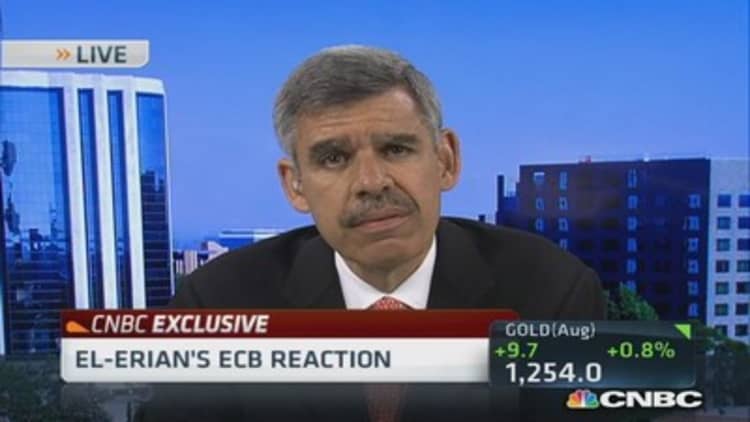
With a series of measures announced Thursday, the European Central Bank has fired a "lots of small bullets" at the euro zone's growth-sapping disinflation, but so far, the markets are not sure it will work, former Pimco co-CEO Mohamed El-Erian told CNBC on Thursday.
The central bank decided to take the unprecedented step of imposing a negative interest rate on banks for their deposits as part of an array of initiatives to spur economic growth.
Read MoreDraghi announces host of economic measures
"So they move simultaneously on lots and lots of fronts, knowing that the experience away from them hasn't been great on a standalone," El-Erian said on "Squawk on the Street." "They're trying a package approach hoping that somehow they're going to get to critical mass."
But, the chief economic adviser at Allianz added, the moves are "a little bit like firing lots and lots of small bullets" rather than a big bazooka.
ECB President Mario Draghi, speaking at the central bank's June monetary policy meeting, said the rate on its deposit facility for banks has dropped from 0 percent to minus 0.10 percent—the first time a major global central bank has moved rates into negative territory.
It also cut its main interest rate to from 0.25 percent to 0.15 percent, and cut the rate on its marginal lending facility by 35 basis points to 0.4 percent from 0.75 percent.
The ECB announced other initiatives, too, including longer-term refinancing operations (LTROs), in which the central bank lends to banks at low interest rates in order to encourage them to lend to households and nonfinancial corporations.
In addition, he said the ECB had undertaken "preparatory work" in order to conduct a form of U.S.Federal Reserve-style bond-buying by purchasing asset-backed securities (ABS) from banks.
Furthermore, Draghi said the ECB would cease sterilizing the liquidity injected from its Securities Markets Program. The program involved the purchase of bonds from troubled "peripheral" euro zone countries.
Read MoreLive blog: ECB cuts rates, more stimulus on the way
Basically, the ECB is simply "buy[ing] time for the system to heal," El-Erian explained.
The central bank had no choice but to take these actions, too, he added, because European policymakers have so far failed to do the things that "really matter," like improve productivity and competitiveness. The new strategy is an attempt by the ECB to put more credit and money into the system, but only few market observers think it will work, he said.
"What people are basically betting on is, for the time being ... this is a tranquil environment," he said. "Of course there is a fallacy of composition here ... If we all believe it and we all go too far, in terms of leveraging risk factors, at the end of the day, we may find ourselves in a rather unpleasant situation and that is the risk right now. It's financial stability versus using an imperfect policy instrument."
To El-Erian, time is of the essence because Europe's economy is so fragile and there are only so many actions left to take.
"There are very few spare tires left on this car, and this car is navigating a bumpy road."


